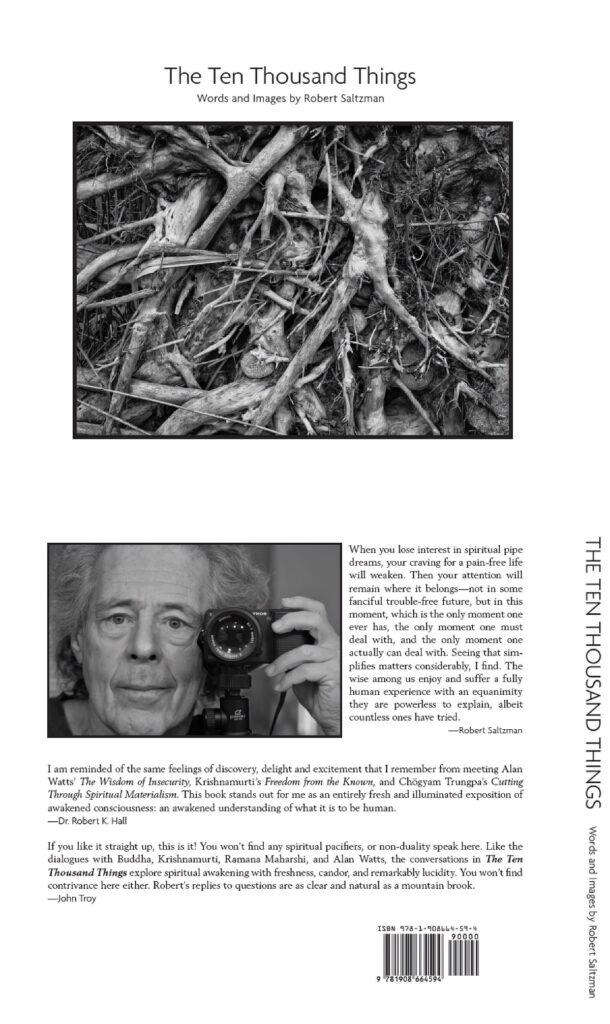Disclaimer: Welcome to the laboratory, explore with an open heart ❤️
The Ten Thousand Things

Posted by Irena:
Irena:
Some of our discussions inspired me
to share an excerpt from Robert Saltzman’s
“The Ten Thousand Things.”
Maybe it resonates, maybe it doesn’t.
As Roger puts it often and Holger reminded me today,
we are always throwing spaghetti at a wall,
maybe something sticks, something falls,
no control over the outcome.
Happy day friends ❤️
“Q3: Amen—a breath of fresh air in the ever-rising sea of techniques to achieve temporary states. I am so happy to return here and to find, as always, not one word about mindfulness practice, tapping, diksha, reiki, chakra-balancing, dietary regimens, new forms of yoga, or a thousand other earnest but limited forms of striving for what can be only temporary relief. Relief from what? Often just the annoying sense of imagined separation that gives rise to a nasty itching to achieve spiritually. The culture of spirituality often seems to be unconsciously mimicking the culturally embedded work ethic. At times it stinks with the odor of correction, of punishment and discipline, as if some all-pervasive “original sin” must be neutralized or counteracted through better and better mindfulness practices or whatever else seems promising to the perpetual seeker.
A: Yes, the concept of original sin is a horrible imposition upon human nature. That term comes from Christianity, of course, and refers to the supposed “fall of man” occasioned by Eve’s temptation of Adam, a clear case of blame the woman. On that score not much has changed: the benightedness of misogyny continues to hold sway over humanity even today. It seems absurd that this is so, but there it is. However, the idea of original sin, even if that particular terminology is not used, underlies not just Christianity, but much of, if not most of, what is called “spirituality,” which assumes, in one way or another, that one’s present condition is somehow flawed, but can be corrected by following a “path” (subtext: a path that lead back to the “Garden”). Such ideas are what I meant by second-hand concepts about reality. You won’t find me talking about “mindfulness practice” because I assume that we are not in kindergarten here. Most of my readers by now have experimented for better or worse with meditation and other similar practices, and would not be asking these questions if “mindfulness” really got them where they wanted to go. There’s nothing wrong with being mindful if that means attention to what is occurring in each moment, but that procedure—the practice of so-called “mindfulness”—has nothing at all to do with being awake, and the two should not be confused. One may try to be mindful, but no one can try to be awake. As far as we know, everything we see, feel, and think is temporary, fleeting, and entirely transient. Like the drunk who famously just wanted the world to stop moving, we may try to impose some version of permanence upon that transiency. That’s what “spirituality” aims at—attaining, in a world of impermanence and mortality, something “permanent” such as the so-called “deathless” state, or union with a god who is by definition permanent. Awakening means dispensing with those fantasies entirely. It means the end of accepting other people’s words about ultimate matters as if they were “truth.” When the fever to attain something permanent comes to an end, and one finds oneself instead flowing along with everything else in the universe, permanent or not, one is awake, I say. As for the other items on your list, I have discussed magical thinking often, and won’t repeat all that here. I think you have it right, “relief from what?” If you have a headache and believe that tapping on imaginary meridians can cure it, fine. Perhaps it can. If you believe that someone can balance your chakras, or that repeating a mantra will lead not to self-hypnosis, but transcendental understanding, fine by me. Knock yourself out. But all that has nothing to do with the simplicity to which I am pointing. In a conversation last year, my friend, Salvadore Poe, said, “This is utterly simple, yet somehow ordinary being seems to elude almost everyone.” I agree. Awake is very simple. In fact, it seems to be too simple for those who would prefer to climb an imaginary hierarchical ladder of spiritual attainment leading at last to “enlightenment,” at which point, they believe, all suffering will cease. That, I say, is nonsense. Does anyone actually imagine being completely immune to physical pain or indifferent to grief upon the loss of beloved companions? A state like that is not “awakeness,” but the neurotic detachment of a fearful, self-hypnotized mind. As far as I know, living has no “purpose.” One finds oneself alive in a world of living beings, never having asked to be here, nor having had any control of the circumstances of one’s birth, one’s family, one’s physical and mental limitations—none of it. Having been dealt that hand of cards, the freedom of simplicity means doing whatever one does—whatever seems appropriate in each moment—while enjoying those thoughts, feelings, emotions that seem enjoyable, and enduring those that feel difficult. That’s life. Any “spirituality” that denies this is nothing but pure escapism in my view. As to where all of this leads, I like the way Alan Watts put it: “When you dance, you don’t aim at a particular spot in the room because that’s where you will arrive. The whole point of dancing is the dance… We thought of life by analogy with a journey, a pilgrimage, which had a serious purpose at the end and the thing was to get to that end, success or whatever it is, maybe heaven after you’re dead. But we missed the point the whole way along. It was a musical thing and you were supposed to sing or to dance while the music was being played.”
One Source
Related Presenters:
Related Friends:
Category:
Tag:
Created: April 23, 2023
Last modified: April 23, 2023

Leave a Reply